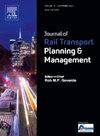有效的实时轨道交通优化:重新路由、重新排序和重新调度问题的分解
IF 2.7
Q3 TRANSPORTATION
Journal of Rail Transport Planning & Management
Pub Date : 2024-12-11
DOI:10.1016/j.jrtpm.2024.100496
引用次数: 0
摘要
铁路交通的实时管理问题是由于各种干扰导致预定的时刻表无法保持;因此,火车必须改道,重新订购,重新安排时间。优化铁路交通实时管理的目的是解决冲突,使延误传播或能量消耗最小化。在我们之前的一项工作中,对现有的混合整数线性规划优化模型进行了扩展,考虑了铁路交通管理中与安全相关的问题,即重叠。然而,在复杂的控制区域和涉及大量列车的交通情况下,求解扩展模型可能会耗费大量时间。因此,我们根据重路由、重排序和重调度子问题对问题进行分解,提出不同的计算效率高的多阶段模型。首先,通过将列车延误重新表述为成对解释,给出了一个轻量级启发式MILP模型,该模型提供了一个快速但次优的解决方案。其次,我们扩展了启发式模型,使其比现有的MILP公式更快地给出原始问题的最优解。在各种现实的模拟交通场景中,通过数学和实验研究了模型分解对优化目标值和计算需求的影响。所提出的多阶段模型大大缩短了原轨道交通管理问题和扩展轨道交通管理问题的优化运行时间。本文章由计算机程序翻译,如有差异,请以英文原文为准。
Efficient real-time rail traffic optimization: Decomposition of rerouting, reordering, and rescheduling problems
The real-time railway traffic management problem occurs when the pre-planned timetable cannot be kept due to various disturbances; therefore, the trains must be rerouted, reordered, and rescheduled. Optimizing the real-time railway traffic management aims to resolve conflicts, minimizing the delay propagation or energy consumption. In one of our previous works, the existing mixed-integer linear programming optimization models are extended considering a safety-relevant issue of railway traffic management, the overlaps. However, solving the extended model can be time-consuming in complex control areas and traffic situations involving numerous trains. Therefore, we propose different computationally efficient multi-stage models by decomposing the problem according to the rerouting, reordering, and rescheduling sub-problems. First, a lightweight heuristic MILP model that provides a fast but sub-optimal solution is given by reformulating the train delays into pair-wise interpretation. Second, we extend the heuristic model to grant an optimal solution to the original problem faster than the existing MILP formulations. The impact of the model decomposition is investigated mathematically and experimentally in various realistic simulated traffic scenarios concerning the optimization’s objective value and computational demand. The proposed multi-stage models significantly decrease the optimization runtime of both the original and the extended railway traffic management problems.
求助全文
通过发布文献求助,成功后即可免费获取论文全文。
去求助
来源期刊

Journal of Rail Transport Planning & Management
TRANSPORTATION-
CiteScore
7.10
自引率
8.10%
发文量
41
 求助内容:
求助内容: 应助结果提醒方式:
应助结果提醒方式:


